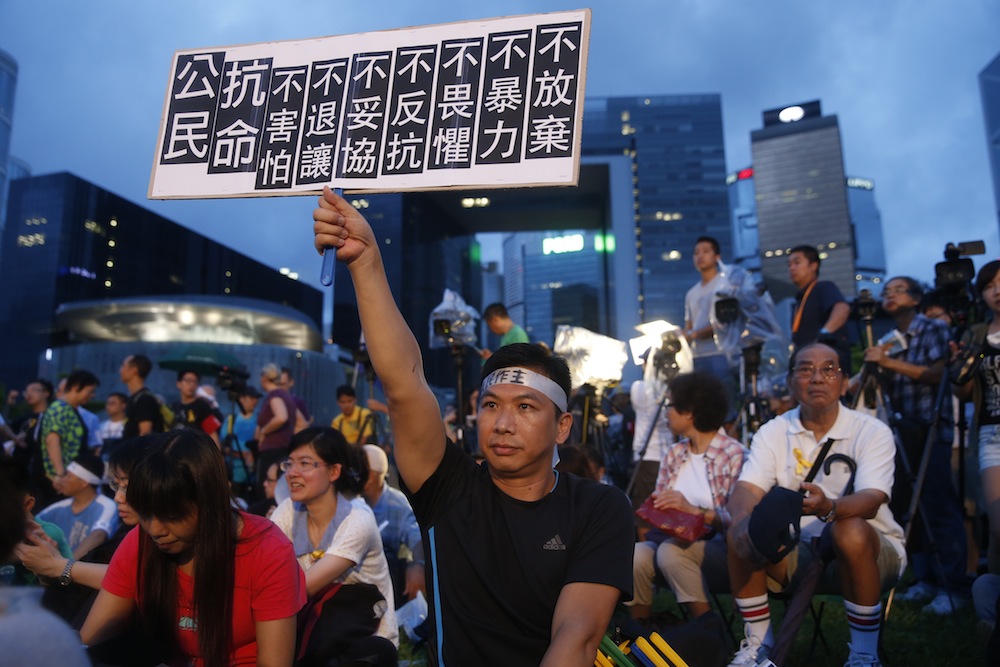The recent decision by the Chinese government to restrict the nomination process for the election of Hong Kong’s chief executive in 2017 all but killed any hope of peaceful democratic reforms in the former British colony.
For veteran watchers of the Chinese Communist Party, this development reconfirms a long-standing pattern of the party’s determined resistance to any effort that could remotely undermine its power. This “take-no-prisoner” attitude reflects thinking that has been hardwired into the minds of present-day Chinese leaders.
As students of history, Chinese leaders have learned many things from the fall of autocratic regimes around the world, ranging from the decadent Bourbons in 18th-century France to the Soviet Union two decades ago. Speeches made by senior Chinese leaders reflecting on these historic events suggest that they have drawn two crucial lessons on the collapse of these autocracies. One is that reforms initiated by ruling elites hoping to survive with a softer approach to governance are ill-advised. Such efforts, however limited, will only encourage the people to demand greater freedom and ultimately unleash a popular revolution toppling the very autocracy naïve reformers tried to save. The arch-villain in this category, in the minds of Chinese leaders, is Mikhail Gorbachev, whose initially modest efforts to reinvigorate a decaying Soviet regime only accelerated its demise.
The other lesson is that rulers must never hesitate to use repression to deter and crush those opposing their rule. Any display of flexibility or softness can only be seen as weakness. When Chinese leaders talk about the fall of the Soviet Union, many lament the former Soviet rulers’ reluctance or failure to use the military, as Beijing did in June 1989, to defend the tottering empire.
Chinese leaders are also shrewd realists. When they face overwhelming odds, they act pragmatically. The greatest practitioner of realism was Deng Xiaoping, who understood that his strategy of saving the party would be doomed if he did not befriend the West, particularly the United States. The reason was simple: Chinese weakness necessitates flexibility and compromise.
However, the cold logic of realism also dictates that Beijing must press for maximum advantage whenever it enjoys a favorable balance of power. Today, as China has acquired immense clout, it is acting with none of the strategic restraints prescribed by Deng, whose famous dictum was “hiding your brightness and biding your time.” The time to assert Chinese power has apparently arrived. Recent Chinese actions, ranging from an aggressive anti-monopoly campaign against giant Western multinationals to the dangerous midair interception of American reconnaissance planes in international airspace, can only be explained by China’s power-centric strategic calculus.
In the case of Hong Kong, Chinese leaders are firmly convinced that they now hold all the cards. According to the “Basic Law,” Hong Kong’s mini-constitution, no electoral reform is possible without the explicit consent of the central government. As for the West, Beijing believes, cynically if not correctly, that no country, including the United States, has neither the stomach nor the ability to make China pay for its actions.
On the surface, Chinese leaders have every reason to feel smug. But a more sobering analysis of their power-centered philosophy of government shows its limits and risks. Reform may lead to revolution, but failure to reform inspires radicalism and guarantees revolution. A reactionary regime needs ever-increasing repression to maintain control. Ultimately, rulers relying on force alone will get caught in a vicious cycle of violence and revolt and lose power.
This dark scenario might befall Hong Kong should Beijing stick to its uncompromising stance. Hong Kong’s pro-democracy forces have multiple means to challenge Beijing’s authority—especially if they become radicalized. In the city’s legislature, they have enough seats to make the life of Beijing’s hand-picked chief executive difficult. Hong Kong’s media, still relatively free, will be even more aggressive and critical in its coverage of the performance of a government that lacks popular legitimacy. And, most troubling, a massive civil disobedience campaign could paralyze the city and lead to violent clashes between the protestors and the authorities. Hong Kong could be torn apart.
Such an ignominious end to the “one country, two systems” system would be a disaster for China. In addition to making Hong Kong ungovernable, Beijing’s hard line approach will surely strengthen the case of the pro-independence forces in Taiwan. The Chinese government will have little credibility to persuade the people of Taiwan that they can count on their promises.
We can be certain that Chinese leaders have weighed the consequences of their strategy. The fact that they have taken such counterproductive actions anyway should make all of us more worried about the future of Hong Kong—and of China itself.
Minxin Pei is a professor of government at Claremont McKenna College and a non-resident senior fellow of the German Marshall Fund of the United States






